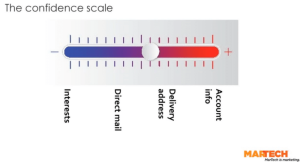Privacy Paradox: Respecting Data Boundaries, Personalizing Experiences
Marketers need to better understand the willingness of people to give up data and what motivates them. Razorfish worked with GWI to develop an online survey that examines the privacy paradox surrounding consumers’ attitudes toward data privacy and how brands walk the fine line between respecting boundaries and creating authentic, personalized experiences.
The online survey, sent to more than 1,600 respondents across the U.S., asked participants to share their attitudes toward data privacy. The study ran from December 2022 through January 2023.
The study shows that one wrong move could be detrimental to consumer trust in a brand. People want control of their data.
One in two survey respondents said they would never do business with a company again if their data was shared without their consent.
The study found that channels matter. Some 29% of participants said they trust devices, while 22% said they trust government, 16% trust tech platforms, and 13% trust brands.
Personalization matters, but 19% of respondents said they were disappointed in efforts made by brands. About 44% found personalization pretty good when it came to experiences. Some 21% found it great, and about 20% found it creepy
Not surprisingly, there appears to be a “sizeable” disconnect between the personalized experiences companies offer and what consumers want. Consumers have become hesitant to share personal information, and are looking to educate themselves on how to take back control of their data ownership.
People are taking steps to protect their data. In the month before taking the survey, 50% of respondents said they blocked emails, while 41% implemented two-factor authentication, 45% prevented an app from accessing their location, and 47% changed their password.
Consumers are uncomfortable sharing personally identifiable information, yet many do this daily. The survey results found that 78% of respondents said they are uncomfortable with face scans being collected, and 71% said they’re uncomfortable with companies collecting photos of them.
The data suggests consumer trust rests on a variety of factors and stipulations. When asked how much they trust or distrust their data with organizations across industries, more than 56% said they “somewhat trust” or “trust a lot” healthcare providers and banks, even though these two industries saw the highest number of cybersecurity incidents in recent years.
Social media companies face the most distrust — at 68% — followed by crypto companies, at 63%.
(1)





